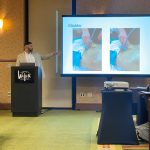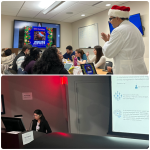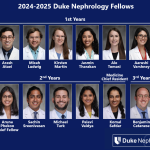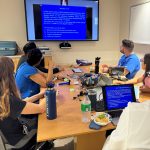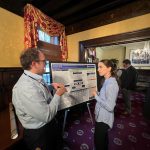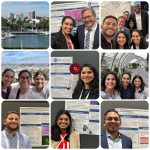Research Programs in the Division of Nephrology
The research programs in the nephrology division cover a wide range of practical issues related to kidney disease and hypertension. These programs were initiated in 1964 by Dr. Roscoe R. Robinson and their initial focus was kidney physiology. More recently, these areas of study have evolved toward the application of molecular and cell biology approaches to the study of issues related to clinical problems in nephrology and hypertension. Specific areas of study include: the immunology of kidney allograft rejection, mechanisms of immunological kidney injury, the genetics of hypertension, molecular aspects of signal transduction by G-protein associated receptors, uremic and metabolic bone diseases and the molecular control of bone formation and development. These programs exist in a setting of significant interaction with investigators in basic science departments here and at our neighboring institution and the breadth of issues being investigated is rich and diverse. This diversity of effort provides a broad base of opportunities for trainees as well as an exemplary environment for laboratory endeavor. Nephrology fellows are encouraged to participate in ongoing research in the division. This typically occurs during the second and third years of the fellowship. In addition, with prior approval of the program director, fellows may complete their research training in laboratories outside of the division. For fellows who are interested in pursuing careers in basic or clinical research a Biomedical Scholar Program is available which provides additional concentrated training in research. Fellows in this program will do 12 months of clinical training followed by 2-3 years of research with an identified faculty mentor. The ACGME requirements for Nephrology will be met after the second year of fellowship. The rationale for this extended training sequence is to provide adequate preparation and training for fellows in the skills that will be required for successful pursuit of careers in basic or clinical research. A listing of faculty with brief listing of their research interests is provided below:
| Faculty Member | Research Interest |
|---|---|
| Blake Cameron, MD, MBI | Medical Informatics in Nephrology |
| Thomas M. Coffman, MD | Inflammatory responses in the kidney, the renin-angiotensin system |
| Steven D. Crowley, MD | Immune system in hypertension |
| Clarissa Diamantidis, MD | Patient Safety |
| Matt Ellis, MD | Kidney Transplantation |
| Mary H. Foster, MD | Proximal Determinants of Nephritogenic Autoimmunity |
| John P. Middleton, MD | Clinical trials to limit progression of CKD and to improve clinical outcomes in ESRD |
| Patrick H. Pun, MD | Cardiovascular outcomes in chronic kidney disease. Development of new therapeutic strategies for the prevention of sudden cardiac death in CKD patients. Disorders of bone and mineral metabolism. Improving deliver of care for pre-dialysis chronic kidney disease patients. |
| John Roberts, MD | Medical Education Research |
| Scott Sanoff, MD, MPH | Kidney Transplantation |
| Stephen R. Smith, MD | Kidney Transplantation |
| Matthew A. Sparks, MD | Vascular control of hypertension, CKD and Pulmonary Hypertension, Social Media and Medical Education |
| Robert F. Spurney, MD | Biology of the podocyte |
| Laura P. Svetkey, MD | Non-pharmacological treatment of hypertension, the genetics of salt sensitivity in African Americans |
| Crystal Tyson, MD | Dietary control of blood pressure |
| Myles Wolf, MD | FGF23 in chronic kidney disease and cardiovascular health |
| Harpreet Singh, MD | Glomerulonephritis |
| Rasheeda Hall, MD, MHS | Geriatric Nephrology, Epidemiology, Polypharmacy. |
| David Ortiz-Melo, MD | Onco-Nephrology |
| Christina Wyatt, MD | HIV-associated nephropathy. Epidemiology of kidney disease in patients with HIV and with HIV and hepatitis C co-infection |
| Alex Grabner, MD | FGF-23 in CKD and Heart Disease |
| Gentzon Hall, MD, PhD | Pathophysiology of focal segmental glomerular sclerosis (FSGS) using human genetics, cell biology, and mouse models. |
| Opeyemi Olabisi, MD, PhD | Molecular mechanisms of APOL1 nephropathy using the human iPS-derived podocytes as a model. |
| Samira Musah, PhD | Inducible pluripotent stem cell (iPS)-derived podocyte models and organ-on-chip model to study mechanisms of human disease. |
| Tomokazu Souma, MD, PhD | Molecular mechanisms of acute kidney injury (AKI) to chronic kidney disease (CKD) transition. |
| Ting Yang, MD, PhD | Prostanoid systems in blood pressure regulation and perioperative neurocognition using a mouse genetics approach. |
| Xunrong Luo, MD, PhD | Cellular and molecular mechanisms that determine tolerance versus immunity in solid organ and tissue transplantation. |






